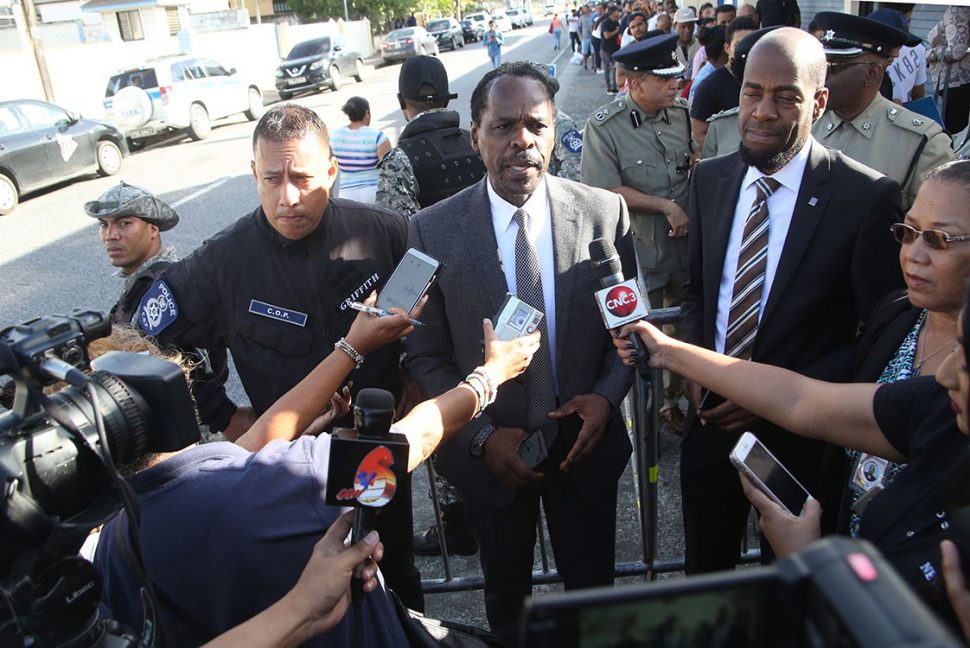(Trinidad Guardian) Hundreds of Venezuelan nationals, some of whom slept on the sidewalks in San Fernando and Port-of-Spain on Thursday night to be ahead in the line, turned out yesterday on the first day of the 13-day registration which will allow them to work and live in this country legally for up to a year.
The response in Tobago was minimal.
Venezuelans trickled into the Tobago registration centre located at the Caroline Building in Scarborough.
There were more security personnel and workers than Venezuelans were at the centre. Before the centre opened at 7 am, a truckload of soldiers arrived adding to a relatively large squad of policemen who had manned the centre overnight.
The hustle and bustle, associated with the exercise, was the only flurry of activity on the island.
National Security officials admitted that the turnout was much smaller than anticipated.
For many who queued up outside the Achievors Banquet Hall, Duncan Street in San Fernando and Queen’s Park Oval, in Port-of-Spain, the process was slow and sometimes frustrating.
Many were unable to print the application form and the website to access it crashed on several occasions. Some complained that translators had difficulty understanding them which dragged out the interview process.
Out of a total of 415 Venezuelan nationals who came to register in San Fernando, the majority were asked to return with proper documents. At the Oval, the gate was closed at 3.30 pm with just about 300 migrants inside still to be interviewed.
Acting National Security Minister Fitzgerald Hinds told reporters outside the Oval it should have taken no more than 15 minutes for each applicant with a registration officer. Hinds said close to 2,000 migrants were processed yesterday.
“From reports I got, the process is rolling smoothly,” he said. However, he said the number of people which the country may have expected to show up to be registered did not materialise, but he reminded citizens it is a two-week exercise.
He was happy, however, that things were off to a “good start. The system worked,” he said.
Hinds said one of the concerns the public has expressed on the issue involved background checks.
“We knew this opportunity would attract criminals, smugglers, human traffickers, gun runners. We want to ensure we don’t import trouble for law enforcement and people so background checks are obviously necessary,” he said.
Hinds said registration cards would not be issued until background checks are done. Interpol has assured they’ll respond more promptly than usual. He said the website with required forms was now accessible after some delay. The forms were meant to reduce processing time and without them, it will take longer.
On what will occur after Venezuelans’ one year permit is over, Hinds said Government could decide anything after the year, but he “couldn’t speak for Government today.” He warned that if Venezuelans did not use the process, they run the risk of “being outside the sunshine” and out of consonance with T&T’s law.
“We remind Venezuelans, you’re welcome to be here, you can work, you’re entitled to basic medical care and all else we can accord you, but we hope you don’t offend the laws. If that happens the police and Defence Force will have to treat with issues,” he said.
Hinds has assured Venezuelan nationals that the information supplied by them for registration will be strictly confidential and will not be shared.
He was responding to concerns by Venezuelans that their families could face political persecution in their homeland if the information they gave to T&T authorities was leaked to Venezuelan authorities.
Business organisations, such as Prestige Holdings, took advantage of the opportunity to offer jobs to the migrants. Digicel also offered free SIM cards to migrants.
Acting Prime Minister Colm Imbert said last week official figures from the Immigration Division revealed 9,080 Venezuelan nationals who arrived in this country legally between 2016 to now and a further 12, 257 had applied had applied for asylum though the United Nations High Commissioner for Refugees.
But the UN has estimated between 40,000 to 60, 000 Venezuelans who fled their homeland to T&T which is facing economic and political crisis.
In the weeks ahead to the registration exercise, boatloads of migrants arrived at secluded beaches across the country. Those who were held by police were granted supervisory orders by the Immigration Division to report back to authorities in 30 days.
The passenger ferries were turned back by the Coast Guard although vessels trading in cargo were allowed to dock at King’s Wharf, in San Fernando.
The Government hopes that all Venezuelans living in T&T will take advantage of the registration process. Those with criminal convictions or pose a threat to national security will be deported. Those who register successfully will be provided with a temporary identification card.
The registration launched by Government to grant amnesty to Venezuelans who have been in T&T legally or illegally will allow them to work for a year.
It will also inform the Government on the number of Venezuelans in T&T following increased arrivals, post-political turmoil “next door”.








